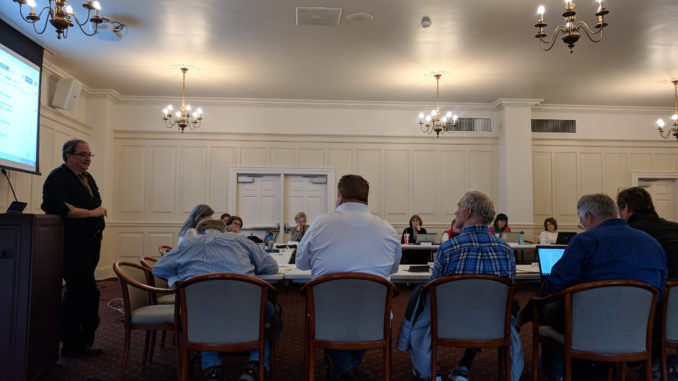
After passing the three courses pertaining to the Truman Symposium at its March 28 meeting, Faculty Senate is moving toward wrapping up work on The Dialogues.
Truman State University is replacing its current Liberal Studies Program with a new curriculum titled The Dialogues. Some of the changes include replacing the disciplinary modes of inquiry with disciplinary perspectives, implementing a new-student oriented Truman Symposium and Self and Society Seminar and tweaking graduation requirements.
Faculty governance voted in February to delay implementation of some parts of the new curriculum until fall 2020.
“I think The Dialogues are going along fine,” Faculty Senate President Scott Alberts said. “I think the idea that we’re going to phase in the implementation, I think that’s taking a lot of the stress out of trying to get everything perfect for fall, especially with the problems we were worried about with the symposium.”
Alberts said he thinks The Dialogues are about 75% complete, and faculty governance will be working on tidying details and polishing catalog language. He said having an extra year to work out the bureaucratic details is beneficial.
Currently, Faculty Senate is working on double-counting courses for multiple perspectives and how to categorize courses that can fit under more than one disciplinary perspective. Alberts said the current bill states that a course can be considered for either perspective, but students would have to choose which one they want it to count for, which he said deviates from the state requirements in an innovative way.
“The broad outline is ready, but as you get into those little tiny details, there’s just a lot that comes up,” Alberts said. “So having that extra time, I think that is just fine.”
In addition to the new course categories being finalized, Alberts said more time to consider new courses for the curriculum will be beneficial.
As Faculty Senate and Undergraduate Council worked on outcome statements for each disciplinary perspective, Alberts said they were not intended to align exactly with the old curriculum, which means it is expected that faculty and departments will update their courses over time to match the newer outcome statements.
Alberts said he is not worried about courses not being updated because there are review systems in place through department chairs and school deans to ensure teaching is up to standard.
Faculty Senate passed course shells for three classes pertaining to the symposium: the Truman Symposium, the upper-level course for transfer students and a course to become a preceptor for the symposium.
One of the aspects the new curriculum is looking to address is Truman’s lack of community, Alberts said. The Self and Society Seminar and Truman Symposium are critical in building a shared identity because most students will have the same experience when starting out at Truman.
As Faculty Senate finishes the curriculum, Alberts said it will begin to take up the University’s personnel policy. He said a committee for the issue has been assembled and will start working on what faculty will look like in the future. Alberts said it looks like Truman will have fewer full-time tenure track faculty in the future, so starting those preliminary conversations now is good.
Alberts said he wishes the Truman Symposium trial went better, but he is happy with the new curriculum as a whole.
“We want it to be amazing,” Alberts said. “To say we’re going to take an extra year to make sure it’s amazing, awesome, kick-ass, whatever words you want to put there, I think that’s what we want, and I think taking a year to do that is okay.”
